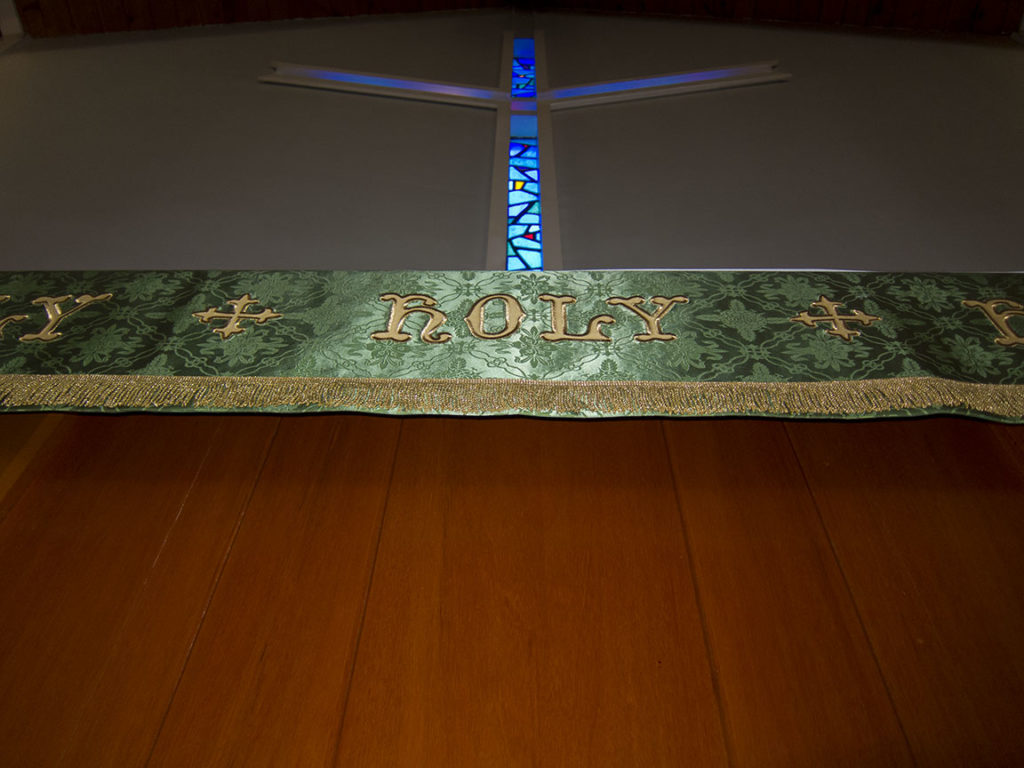Rev’d Mark B. Stirdivant, Good Shepherd Lutheran Church, Yucaipa, California
✝ sdg ✝

Rainbow at Sunset
Joseph had quite a life. His brothers hated him when he was younger because their aged father loved him more noticeably than he loved them. Joseph was the first-born son of Jacob’s wife Rachel. And it was Rachel whom he loved more than his other wives, including Rachel’s sister Leah. Grudges, revenge and spite were common threads in this family—it’s clear that this story is not included in Scripture to make it a moral example for us to follow, in the slightest!
Now that we’re at Genesis chapter 50, these older brothers are well into their grandparent years, but they could not put out of their minds what they did to Joseph at least 35 years before, out of their hatred. The decades-old guilt could not be quenched. They had sold him into slavery and he was taken down into Egypt. Joseph was ripped away from his loving father Jacob at the age of 17. He was later thrown into prison for a crime that was fabricated by his master’s wife.
Now look at Joseph! He’s the one in charge of the whole Egyptian kingdom. All the riches and fame that Joseph had now as the most powerful man in the land, second only to Pharaoh, still couldn’t reverse what his brothers had done to him (so they reasoned). Ironically, the brothers were by this time also living well in Egypt. Joseph was providing for them and their families, and that despite the widespread famine. Joseph had forgiven them, but the brothers were still leery. They assumed that Joseph harbored the same hatred that they once had against him, even after all those years. Now that their father Jacob died, they feared that Joseph would seize the opportunity to take revenge.
They knew well the language of our sinful flesh, which does not allow for love and forgiveness. It just doesn’t make sense to the world. The guilt these brothers had inside made them afraid of Governor Joseph, much like Adam all of a sudden became afraid of God walking in Eden’s garden, once in his sinful act he became aware of good and evil. Joseph’s brothers thought they were protected by the life of their father, and now that shield was gone. What they had done against their little brother was quite an injustice, and they knew that he had every right to pay them back—that was what they feared.
We often fail to realize that God Himself had undergone the grossest injustice, and that’s from us! He created us in His image and gave us the ability to love Him and each other. Along with that great privilege comes the responsibility to obey Him, to live in harmony together as His creatures. He requires us to have no other gods, to obey and give honor to our parents, he requires us to love our neighbors as ourselves. Have you lived up to those requirements? The words in our liturgy that we pray, “…I have ever offended You and justly deserved Your temporal and eternal punishment,” put it about as nicely and truthfully as it can be said. You are guilty, as am I, guilty of committing great injustice, not against any particular person, but against God Himself! This guilt we may want to forget and we might succeed at burying it for a while, but sometimes it may linger around a long time in our hearts, much like it did for Joseph’s brothers.
Then what’s this we keep hearing about a loving God? We would like to think that since God has promised to love us and forgive us, then our sins would no longer be a problem. But what do you see around you every day? It sounds good in theory, you may say, but in reality, my household can sound a lot like Joseph’s brothers, with threads of grudges, revenge and spite. If God is so forgiving and so loving, then why does this still happen to me? Why do I feel I have to keep looking over my shoulder to see if God is punishing me for my sins against Him? We also ask with Peter, How many times do I have to keep on forgiving my brother who sins against me?
Sin is real, utter treachery against God, not some petty mishap that you can forget about later. The guilt that comes from sin is also real—the Bible has a name for it—it’s iniquity. We’re not talking about just an uncomfortable feeling in the gut. It rules over our very being. The truth is that each one of us is completely enslaved by sin from birth. Standing before God on our own merits, we are like the servant who owed the king 10,000 talents, approximately 350 tons of silver, due immediately. Yet we still think we can get by. “Be patient,” the servant in Jesus’ parable said, “and I will pay back EVERYTHING.” Does that sound like you? Do you think that you can “strike a deal” with God?
Sin must be paid for. Its guilt must be quenched. It cannot be set aside and forgotten. As Joseph’s brothers could tell you, this kind of guilt is persistent. Your conscience may remind you about something you did, even if that sin was already forgiven. Something as real as sin needs a real solution to address it. Our huge debt that we owe to God can be forgiven only by an act of His marvelous grace.
And that is exactly what He has done! When Jesus told the parable of the merciful king, He was speaking of Himself. Our debt was taken off our shoulders and put on His. He took care of our sin once and for all by shedding His blood on the cross. His resurrection proved to all creation that the bill has been PAID IN FULL by our merciful King of Kings. God did something very surprising. He did not take revenge on us, like we deserved, but He punished Jesus instead. It wasn’t fair to our Lord at all, but out of that gross injustice came the saving of many lives.
Peter preached a sermon in Jerusalem that sounded a lot like Joseph’s reassuring words to his brothers. This is what he said in Acts chapter 3: You killed [Jesus] the author of life, but God raised Him from the dead. We are witnesses of this. And here the similarity was implied: What you intended for evil, God intended for good, for the saving of many, many lives- your life and mine included this time! Our loving Father has this way of turning evil on its head, of reversing the grim reality of death we have to face, and instead bringing forth life—life that is offered to you today. As Jesus breathed His last on the cross, He pronounced total victory over sin and death. You, as one crucified and buried together with Christ, also died to sin, and you are raised each day with Him, through your baptism, to new life.
Because Jesus died for you and was raised from the dead, God now speaks words of forgiveness to Your hearts and cancels your massive spiritual debt. The righteous demand of full payment for sin has been met; as real as sin is, it has been overcome by the greater and fuller reality of God’s forgiveness. We become the creatures He had made in the beginning, taking on Christ, the image of God. We stand confidently before His presence without blame or spot.
Jesus says to us: Do not be afraid. All has been forgiven. I have taken your sins to the grave with Me and they have no power over you any longer. Rejoice in the new life you now share with Me because I have won the victory over sin and death forever.
It’s true that an assurance like that cannot come from inside you. No amount of self-encouragement can improve your eternal standing. Peace within your heart can only come from God. To know that peace, the peace that comes from God’s forgiveness, acknowledge your utter debt and poverty, that you don’t come before God on your own terms but at His invitation. Confess your sins before God. Plea your case for the sake of His mercy, and you will be assured.
You see, Joseph’s older brothers first tried to approach him on their terms. They turned their guilty conscience’s confession into an indirect order to Joseph. They invoked their sainted father, Jacob, putting into his mouth a last dying wish, as it were, that Joseph would forgive them. You may have given an apology like this: “I’m sorry, BUT this is why you OUGHT to forgive me, it’s only the Christian thing to do…” Human pride can have no part in any confession of sin.
You can tell the brothers completely lost hope when they finally reached Joseph’s presence. There they were in his courtyard, with nothing between them but the unresolved guilt. No longer did they sense having the upper hand to work out a deal for their forgiveness. They were ready to give up and become Joseph’s slaves, because they were so crushed with guilt. Quite a different attitude from the time when they sent the message, isn’t it?
Joseph forgave them. He told them repeatedly: Do not be afraid. He wasn’t going to take revenge; he wasn’t even going to take them up on their offer to make them his slaves. He assured them by saying God turned this evil that they had done into something good. He didn’t say it as though they were right to sell him into slavery 35 years before. He did say that God is in control, as He always is. He spoke tenderly to their hearts; what was broken has now been made right.
God speaks to your heart today, and to your brothers and sisters in Christ. He is here today forgiving you, feeding you with His Body and Blood, that you may have full assurance despite any doubts that might return to you later. You don’t even have to come up with your own apology—He gives you the perfect words to say! Meditate on the words from Psalm 51 that are in the liturgy: Create in me a clean heart, O God, and renew a right spirit within me. Cast me not away from your presence, and take not your Holy Spirit from me. Restore unto me the joy of your salvation, and uphold me with your free spirit.
You acknowledge the forgiveness that comes from Christ and what He did for you. It’s not that you repeat certain words like a magic formula, but rather you’re trusting the promise that backs these words up. Believe that God is actually saying to you: I forgive you all your sins, and you will be confident in Him.
As you are confident that your heavenly Father will not take revenge against you, now you are free to abandon revenge against those closest to you who have done you wrong. Instead you may say: “Do not be afraid. What you did hurt me, yes, and I forgive you. God can now make something good come out of the situation.” There is great healing and a great future for our church today- it all starts with forgiveness.
God has come today to give you His forgiveness, and He follows it up with the love that binds us to each other in Christ as His Holy Church. Do not be afraid; confess your sin to God and to each other. Trust in Jesus and He will provide for you and your family, even making good come sometimes out of bad. Do not be afraid.
In the Name of the Father and of the ✝ Son and of the Holy Spirit.








